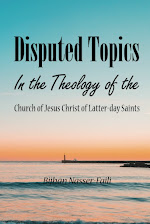The next set of scriptures that John MacArthur quotes in support of his theology is from John Chapter 6. This is what he says:
“Turn to chapter 6 of John and I am going to show you the consistency...and by the way, these aren’t separated by being in a different book, written by a different author, these are in the same conversations in the same context. In John 6 verse 37...well, let’s go to verse 35. In verse 35 Jesus says, ‘I am the bread of life, he who comes to Me will not hunger. He who believes in Me will never thirst, but I say to you, that you have seen Me and yet do not believe. If you believed, you wouldn’t hunger. If you believed, you wouldn’t thirst. If you believed, you would have life, but you don’t believe.’ Human responsibility, human will.”
Agreed, it implies human responsibility. He continues:
“Then you come to verse 37, ‘All the Father gives Me will come to Me and the one who comes to Me, I’ll certainly not cast out and I’ve come down from heaven not to do My own will but the will of Him who sent Me, and this is the will of Him who sent Me that of all that He has given Me, I lose none but raise him up on the last day.’
“Wow! So salvation belongs only to those whom the Father gives to Christ.”
Sure; except that the “predestination” he is looking for is still not implied. He continues:
“Look at verse 44, ‘No one comes to Me unless the Father who sent Me draws him.’ So nobody is going to come to Christ if they’re not drawn by the Father, sovereign power. Nobody comes to Christ unless they’re given to Christ by the Father. That’s divine sovereignty.”
If by “divine sovereignty” he means that the Father draws people to Christ unconditionally, without any merit on their part, no such thing is suggested or implied in that verse. He continues:
“Jesus says, ‘I came not to do My own will but the will of Him who sent Me and His will is that of all that He has given Me, they would come and I would lose none of them.’ So that’s divine sovereignty. The Father chooses, the Father draws, the Father gives to the Son, the Son receives, the Son keeps, the Son raises. Divine sovereignty. And yet, verse 35, ‘He who believes in Me will never thirst and yet You’ve seen Me and you do not believe.’ That is human responsibility.
“Look at verse 47, ‘Truly, truly I say to you, he who believes has eternal life.’ Verse 57, ‘As the living Father sent Me and I live because of the Father, so he who eats Me takes Me in, he also will live because of Me.’”
All of his implied suggestions with regard to the above references are baseless and unjustified. There is nothing in those verses that suggest that God the Father “gives” people to Christ, or “draws” them to Christ unconditionally; or by some kind of “sovereign act” without any regard to the person’s merit or worthiness. Nothing like that is implied by those scriptures. That is what he likes to read into it, but it is not there. I have already discussed John 6:44, 65 with respect to the doctrine of “unconditional election” in another post titled “Limited vs. Universal Atonement,” therefore it is not necessary to discuss it here. But his insistence that God’s divine sovereignty must necessarily cancel out human freedom, or that the two are incompatible and irreconcilable is not true. I have shown in the first post in this series how they can be reconciled. He then continues:
“On the one hand, nobody comes unless the Father draws him. Nobody comes unless the Father drawing him gives him to Christ and yet whoever believes can come, whoever doesn’t believe is lost. At the end of the chapter, near the end of the chapter in verse 63, it says, ‘It is the Spirit who gives life.’ We’ve already seen that. Of course, it’s a spiritual work down from above. It’s the Spirit who gives life. The flesh profits nothing. It’s a spiritual work. It’s divine. It’s from heaven. It’s from above. But verse 64, ‘But there are some of you who don’t believe.’ And then verse 65, ‘For this reason I have said to you that no one can come to Me unless it’s been granted him from the Father.’
“How do you harmonize these? I don’t know. Nobody’s coming unless it’s from the Father. Nobody’s coming unless drawn by the Father. Nobody’s coming unless given by the Father to the Son. And yet He says, ‘Whoever believes can come.’”
Of course they can be harmonized. See here for how they can be harmonized. His inability to harmonize them arises from his bias towards, and entanglement in Calvinistic and “Reformed” false theology of predestination, “faith alone,” and TULIP. In his mind everything needs to be resolved in those terms. He can’t get away from it. He can’t “think out of the box”. His mind is trapped in that box, and he can’t get out of it. Once one starts thinking out of that box, harmonization is not difficult to achieve.
The remainder of his sermon will be discussed in a subsequent post.



No comments:
Post a Comment